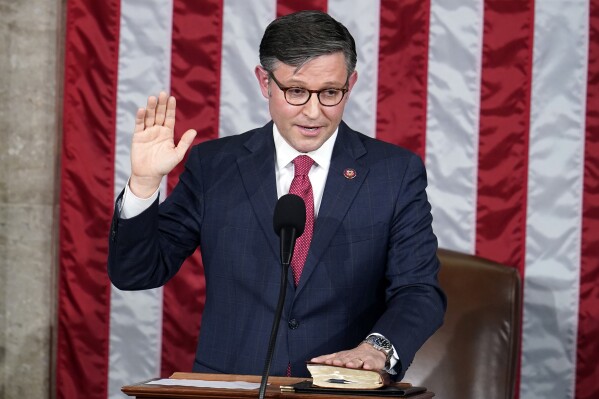I am going to take a fourth bite of the apple on budget reconciliation because it remains the most important issue facing the 119th Congress. After spending all that effort explaining to you why including the debt ceiling hike in a reconciliation bill risked Trump’s entire first-year legislative agenda, I am not surprised to learn that Speaker Mike Johnson has decided it won’t work. They’ll still pursue a reconciliation bill to advance Trump’s energy, immigration and tax cut extension priorities, but they will do the debt ceiling separately and in a way that will rely on Democratic votes in both the House and Senate.
Speaker Mike Johnson on Tuesday backed away from a plan to address the approaching federal debt cliff in a party-line reconciliation package, acknowledging several major challenges that may force Republicans to deal with the borrowing limit in bipartisan talks with Democrats.
This is a rather big problem for the Speaker. As Bloomberg News reported back on December 23, 2024, Johnson made a commitment to budget hawks in his caucus that he would not negotiate with the Democrats to raise the debt ceiling again. Instead, he promised that he would ask the House Republicans to do it themselves. The deal was that he would offer a reconciliation bill that cut a staggering $2.5 trillion in mandatory spending over ten years, and in return his caucus would nearly unanimously support authorizing an additional $1.5 trillion in debt payments. These massive cuts were supposed to entice the many GOP members who have never supported a debt hike to change their tune:
Rep. Eric Burlison (R-Mo.), shared similar sentiments, that he was open to raising the debt ceiling despite his previous vows he would never touch a debt-limit measure. If Republicans could follow through on their ambitious reconciliation agenda, he could support it.
“You got people like me who have never raised the debt ceiling but if you’re fixing the border and you’re instituting a bunch of fiscal cuts then that’s a completely different conversation and I think it passes overwhelmingly by Republicans,” Burlison said.
That was always a reckless long shot considering that Johnson could not lose more than two Republican votes or the whole strategy would crash like the Hindenburg blimp, taking immigration, energy and tax cut extensions along with it. In addition to the GOP’s debt ceiling phobia, the $2.5 trillion level of cuts in mandatory spending were simply unrealistic because they’d prove too unpopular to get near unanimous support from Republican lawmakers. But it was a commitment that Johnson made, and now he has broken it.
Now, remember, Kevin McCarthy was ousted as Speaker for relying on Democratic votes. He did it to raise the debt ceiling and survived, but when he was forced to do it again to avoid a government shutdown, it cost him his job. Out of necessity, Johnson repeated both of these offenses. He only survived because Trump defended him and the Democrats promised to save him from any challenge. For the Democrats, this was because they were grateful he didn’t allow a devastating nation credit default. They won’t save him again.
Still, Johnson has a little more protection than he and McCarthy had in the last Congress. This is because the 119th Congress passed a new rules package that increased the number of members required to force a vote to vacate the chair (i.e., remove the Speaker) from one to nine.
The House Freedom Caucus wasn’t happy about the change, so they issued a letter signed by 11 members (more than the nine now needed to oust Johnson) warning him that they wanted the reconciliation bill to “reduce spending and deficit in real terms” and that it must not increase federal borrowing unless “real spending cuts are agreed to and in place.” They were operating under the assumption that the debt ceiling would be handled under reconciliation rules, as Johnson had promised, but now that has changed.


That the Freedom Caucus was making unrealistic demands on Johnson seems not to have occurred to them anymore than it did when they made unrealistic demands of Speakers John Boehner, Paul Ryan and Kevin McCarthy. But we can see from their letter that they’re very interested in the success of Trump’s agenda. That agenda will now be pursued in two ways they won’t like. The first is that the reconciliation bill has been decoupled from the debt ceiling, meaning they can’t threaten a catastrophic credit default to compel outrageous cuts in mandatory spending. The second is that when it comes time to fund the government to prevent a shutdown, a deal will have to be struck with Senate Democrats to get around a potential filibuster. For this, they will blame Johnson.
To take the sting out of this turn of events, Johnson is considering attaching the wildfire aid package to California to the debt ceiling hike. The idea is that he may need the Democrats for a debt ceiling hike but can compel a lot of them to support cuts in the deal they don’t like if the cost of opposing it is casting a vote against emergency aid to California.
It’s a horribly cynical move, but it is probably necessary if Johnson is going to appease his Freedom Caucus opponents. It’s also probably necessary if the Republicans are serious about following through with their equally cynical promise to also attach conditions to the emergency aid package which the Democrats would otherwise vehemently oppose.
Whatever happens, it’s generally agreed that the debt ceiling will have to be raised before June to avoid a default. Trump wants it lifted for the remainder of his term, but I can’t see either party going along with that.
In the meantime, with the debt ceiling now decoupled from the reconciliation bill, Johnson has set out an aggressive schedule. According to Punchbowl News, he told his conference he wants them to pass the budget resolution for reconciliation by Feb. 27. Passage of the resolution is a prerequisite of getting on the actual bill. As Roll Call helpfully explains, according to the historic guidance of Senate parliamentarians, the Republicans can’t do more than one tax/spending bill on a single budget resolution. If they don’t overrule this guidance, they will have to handle everything under one bill. But it seems unlikely that the GOP can thrash out an agreement on all the contentious issues in an extension of the 2017 Trump tax cuts by February 27.
One solution, supported by Senate Majority Leader John Thune and others, is to pass a second budget resolution to address the tax extension, and deal with that after first tackling immigration and energy issues in the first resolution. But Johnson opposes this and Trump has expressed a desire to handle it all in “one big, beautiful bill.” Perhaps Johnson is coming around to this idea without expressly admitting it. Or maybe he has a magic wand we don’t know about.
Here’s what I can tell you. Pressure breaks pipes. When a submarine goes too deep, the rivets begin to pop. The Republicans’ desire to govern without making any concessions to the Democrats despite their very narrow majorities is problematic because there are so many pressure points. The first rivet to pop was the decoupling of the debt ceiling from the reconciliation bill. This guarantees that Democratic votes will be required. That creates a new pressure point, and the coupling of wildfire aid to the debt ceiling is an effort to prevent another rivet pop. If Johnson soon concedes the need for two reconciliation bills, that will a third rivet pop.
Their plans were not realistic from the outset, but there are ways to keep hope alive. They can overrule the Senate parliamentarian. They can use the nuclear option to finally eliminate the legislative filibuster. They will be tempted to do these things and others I can’t even imagine to avoid having to make concessions and to enact Trump’s agenda. And, yet, all of this may still not be enough. There are some divisions among congressional Republicans that are hard to bridge no matter how many rules and precedents they trample in the effort.







It doesn’t seem like the leverage around CA aid is a very strong card for the GOP. It’s so transparently punitive and assholish that though it might satisfy MAGA appetites, it could also be rejected out of hand because it’s just stupid and cruel. So maybe it’s more likely we would instead do what we always do as democrats when they need our votes: agree to rescue them if we actually get something in return that is additional, rather than just get threatened with getting things taken away that should be considered givens.
I will continue to unrealistically call for all House Democrats to vote against everything a Republican Speaker of the House brings to vote unless that bill is 100% legitimate.
Trump will blame Democrats for House Republicans failing to pass simple majority vote legislation, and Democrats should just go on TV with a piece of paper showing that Republican House Members are the reason why Trump didn’t get whatever he wanted from the legislation… and then just walk away from the camera. Every time. Fuck, have scotch tape and tape that piece of paper to the fucking camera.
That definitely includes the Debt Ceiling, which we should have let default years ago. No, I don’t give two fucks about the “repercussions” of letting the Debt Ceiling go, there has to come a time where this stupid hostage taking bullshit by Republicans gets called, and voters pretty much already know it’s the Republicans who brought this shit on themselves every time the government shuts down, or possibly worse with a default.
Let it shut down, and just hammer it over and over that Republicans are the ones using it as a hostage.
Are we trying to win elections here or what.
You would give a shit in a hurry if U.S. bonds were no longer considered a rock-solid investment.
I don’t want a default, and I also don’t want fascism. I know which one I’d be OK trying first. That’s where I’m at.
That said, I said way up in my first sentence that what I’m OK with is unrealistic.